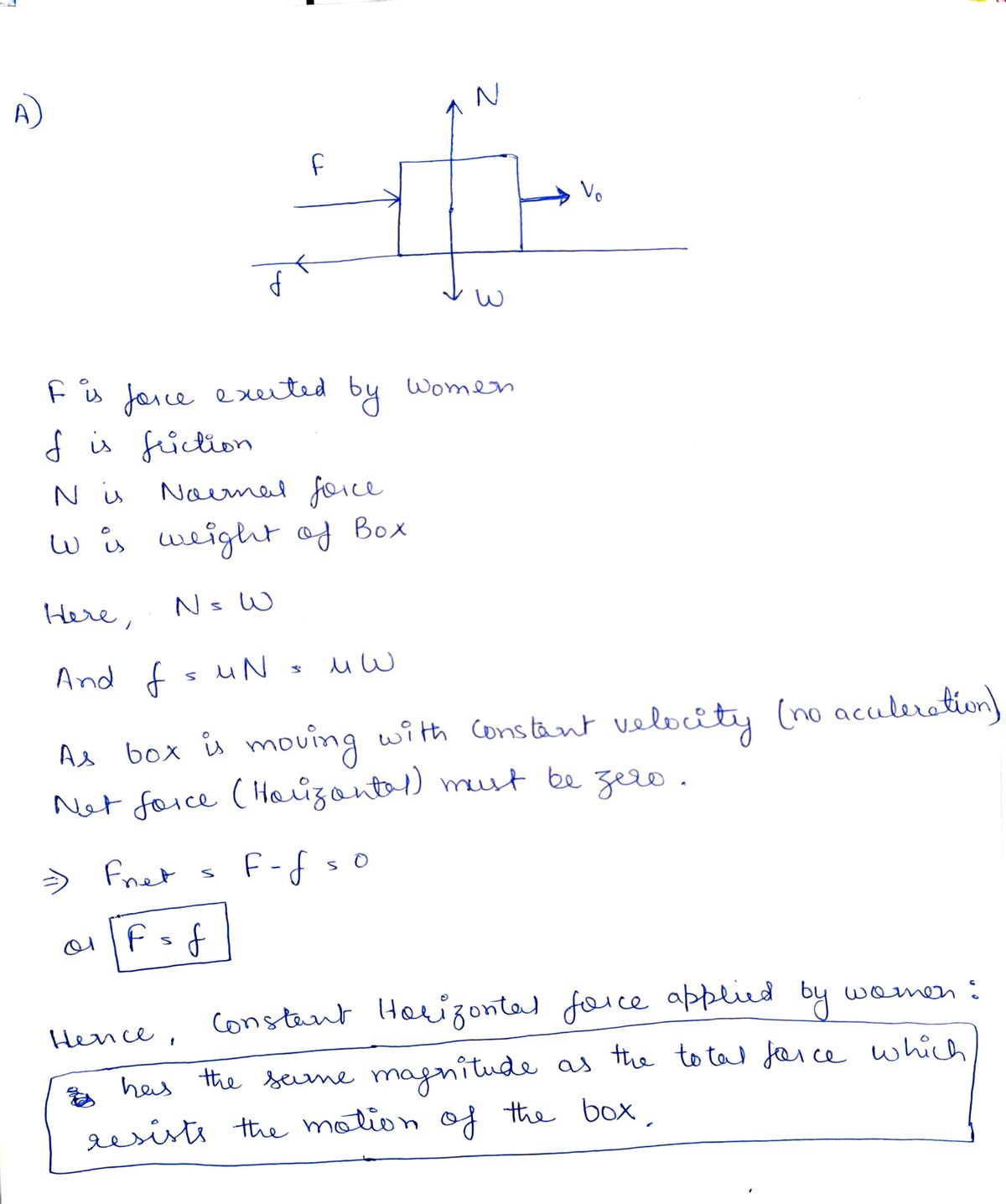A) A woman exerts a constant horizontal force on a large box. As a result, the box moves across a horizontal floor at a constant speed "v0". The constant horizontal force applied by the woman:
A) A woman exerts a constant horizontal force on a large box. As a result, the box moves across a horizontal floor at a constant speed "v0". The constant horizontal force applied by the woman:
College Physics
11th Edition
ISBN:9781305952300
Author:Raymond A. Serway, Chris Vuille
Publisher:Raymond A. Serway, Chris Vuille
Chapter1: Units, Trigonometry. And Vectors
Section: Chapter Questions
Problem 1CQ: Estimate the order of magnitude of the length, in meters, of each of the following; (a) a mouse, (b)...
Related questions
Question
A) A woman exerts a constant horizontal force on a large box. As a result, the box moves across a horizontal floor at a constant speed "v0".
- The constant horizontal force applied by the woman:
- has the same magnitude as the weight of the box.
- is greater than the weight of the box.
- has the same magnitude as the total force which resists the motion of the box.
- is greater than the total force which resists the motion of the box.
- is greater than either the weight of the box or the total force which resists its motion.
B) If the woman in the previous question doubles the constant horizontal force that she exerts on the box to push it on the same horizontal floor, the box then moves:
- with a constant speed that is double the speed "v0" in the previous question.
- with a constant speed that is greater than the speed "v0" in the previous question, but not necessarily twice as great.
- for a while with a speed that is constant and greater than the speed "v0" in the previous question, then with a speed that increases thereafter.
- for a while with an increasing speed, then with a constant speed thereafter.
- with a continuously increasing speed.
C) If this same woman above suddenly stops applying a horizontal force to the box, then the box will:
- immediately come to a stop.
- continue moving at a constant speed for a while and then slow to a stop.
- immediately start slowing to a stop.
- continue at a constant speed.
- increase its speed for a while and then start slowing to a stop.
Expert Solution
Step 1

Step by step
Solved in 2 steps with 2 images

Knowledge Booster
Learn more about
Need a deep-dive on the concept behind this application? Look no further. Learn more about this topic, physics and related others by exploring similar questions and additional content below.Recommended textbooks for you

College Physics
Physics
ISBN:
9781305952300
Author:
Raymond A. Serway, Chris Vuille
Publisher:
Cengage Learning

University Physics (14th Edition)
Physics
ISBN:
9780133969290
Author:
Hugh D. Young, Roger A. Freedman
Publisher:
PEARSON

Introduction To Quantum Mechanics
Physics
ISBN:
9781107189638
Author:
Griffiths, David J., Schroeter, Darrell F.
Publisher:
Cambridge University Press

College Physics
Physics
ISBN:
9781305952300
Author:
Raymond A. Serway, Chris Vuille
Publisher:
Cengage Learning

University Physics (14th Edition)
Physics
ISBN:
9780133969290
Author:
Hugh D. Young, Roger A. Freedman
Publisher:
PEARSON

Introduction To Quantum Mechanics
Physics
ISBN:
9781107189638
Author:
Griffiths, David J., Schroeter, Darrell F.
Publisher:
Cambridge University Press

Physics for Scientists and Engineers
Physics
ISBN:
9781337553278
Author:
Raymond A. Serway, John W. Jewett
Publisher:
Cengage Learning

Lecture- Tutorials for Introductory Astronomy
Physics
ISBN:
9780321820464
Author:
Edward E. Prather, Tim P. Slater, Jeff P. Adams, Gina Brissenden
Publisher:
Addison-Wesley

College Physics: A Strategic Approach (4th Editio…
Physics
ISBN:
9780134609034
Author:
Randall D. Knight (Professor Emeritus), Brian Jones, Stuart Field
Publisher:
PEARSON